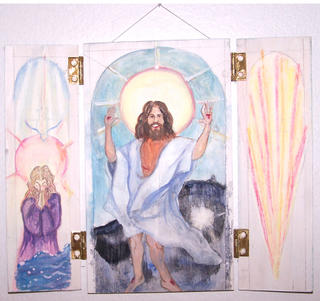Hermeneutical Schools of Thought
In his anthology of essays entitled "The Weight of Glory", CS Lewis writes "Is Theology Poetry?" During the '40s and '50s, scientists wrote off scripture as "mere poetry" rather than permitting it to say something true about the world.
This exemplifies several schools of thought that are now active in this discussion - even here on this site.
School 1: [Modern Scientific Naturalism] Theology (and, by extension, Scripture) is "mere poetry", and therefore, while it is made up of pretty-sounding words, does not have anything (or much of anything) true to say about the world. (Traditional Science Anti Theology as Non-Science)
School 2: [Modern Fundamentalism] Theology (and, by extension, Scripture) is a better scientific framework in which to work than Scientific Naturalism. Theology is not poetry, because poetry doesn't talk about Truth. Therefore, not only is Scripture a scientific document, but we are to fit anything we find into its literal understanding. Anything we find that doesn't line up is "bad data" or "misinterpreted." The Bible isn't poetry, it is fact. (Scripture as Science Anti Traditional Science)
School 3: [Modern Conservatism] Theology (and, by extension, Scripture) is a mixture of poetic metaphor and "cold hard facts." Poetry can, in fact, describe truth, but to find that truth, we take our poetry largely at face value. This means we examine poetry for the truth framework behind it, and use that to describe how Science and Theology can mesh. (Scientific Harmonizing of Traditional Science and Theology's Scientific Aspects)
School 4: [Modern Peacekeeping] Theology is poetry, and that poetry speaks of truth that Science cannot understand. Scripture is Theology. Nevertheless, Science speaks of truth Poetry could never describe. Scripture was written before Science; therefore, it doesn't play by Science's rules. They talk about two different things, therefore, they both can coexist, but one cannot accuse the other of anything problematic. (Peaceful coexistence of Theology and Science as long as no one encroaches on the other's territory)
School 5: [Postmodern Sacramental] Theology is poetry, and Poetry is inherently true. The truth will probably not be found on its surface. The sub-surface nature of truth means that there can be a number of valid interpretations, because all we have to work with is the surface and the truth of the poetry is a mystery that is beyond us. At the same time, Scripture is an ancient set of documents produced by the people of God through God for the people of God, written in an ancient mindset to ultimately describe truth, but not in written form. Truth is a person, the person of Jesus Christ. Therefore, we do not access truth through documentary analysis but through getting to know the person Jesus Christ. Science, too, is poetry, describing things that aren't quite measurable, since the act of measurement changes the thing being measured. Nevertheless, we describe the truth within the confines of our philosophical perspective, which includes Science and Scripture. Therefore, our Theology describes the Truth- the Person of Jesus Christ - through the ancient Scriptures, the history of God with his People, and through our current cultural-philosophical understanding. While Scripture is still Canon (i.e., the measuring stick) it is a component part with Science, language, culture, experience and history in a Theology that ultimately describes Jesus Christ. As any person is, he can only be quantified when he is dead, thus missing key components of who he is. Therefore, much remains a mystery (Latin, Sacramentum). (Theology describes Truth Poetically as a living person using whatever means are at its disposal: Scriptural, Scientific or otherwise.)
School 6: [Postmodern Agnosticism] Poetry describes what is real. So does Science. But we can't see enough to describe it well. It's hard to know anything. So can we even know anything at all? Both Science and Theology are bunk. The Bible is an old book. Go with what feels right. That's all you can trust. Either party on or destroy yourself. (Theology, Scripture, and Science are pointless because we can't know anything.)
These six schools of thought are all active in the discussion. Part of the reason we talk past each other is because we don't realize that. I suspect Grant's question is either #3, #4 or #5 addressing #2 or #3. John clearly answers with #3 with a touch of #4. It's not clear from Grant's question whether he's coming from #3 or not.
I offer #5 as a genuine alternative because it removes the frame that created the problematic question in the first place. First, it doesn't equate Theology and Scripture. Second, it doesn't put them in opposition to Science. Third, it acknowledges that our outlook shapes our theology. Fourth, it permits truth to exist poetically without analysis.
Thoughts?
I'll cross-post this at M Squared T and the Pub so that the thread can develop on its own and not detract from Grant's original question.







